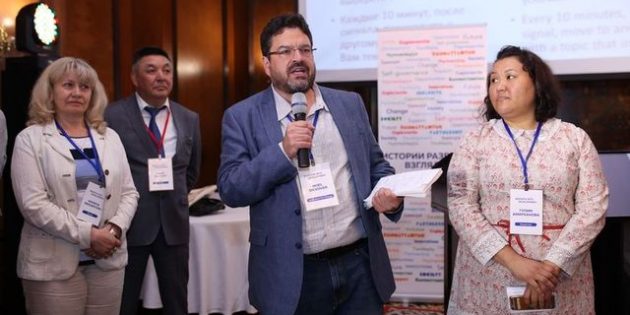One of the most significant events during the “Insights into Development” Conference was the launch of the Global Innovation for Change Initiative, involving the Central Asian region, Afghanistan and Mongolia.
The Innovation for Change initiative is a rapidly growing global network of people, online centers and soon to be regional hubs in Africa, Central Asia, Eastern Asia, Latin America and the Caribbean, the Middle East and Northern Africa, and South Asia.
These are common working spaces, both physical and virtual. People and organizations can share ideas, discuss today’s challenges, and create solutions that will help to shape the future. 
Participants in this interactive platform help carry out campaigns and develop programs by offering consultation services, education and training, fundraising, free online tools, and support in the development of technological products.
Central Asia participants in Innovation for Change will obtain access to the latest developments and also learn from their peers’ experiences in different countries of the world.
“This is an initiative with a very simple goal – to apply these or other solutions in other communities. One person has no answers to all questions; each of us has a piece of puzzle. We try to think broader and make a commitment not to copy successful solutions, but to transform them and scale up approaches,” stated Alex Sardar, Innovation for Change (Global).

“We liked the idea of this initiative very much. As a result, last February we organized a brainstorming session in order to define goals and objectives of the Innovation for Change organization specifically for our region,” noted Philipp Reichmuth, Innovation for Change (Regional).
The idea for the initiative was to create an organization that supplements but not substitutes. The initiative is based on 5 key values:
- Maximum open membership – every participant should agree with the main values, goals and objectives of civil society on the global scale.
- Simplicity – voluntary communication between participants.
- Subsidiarity – if we can solve a problem or task on a low level, then it does not need to be taken to a higher level.
- Added value – not just communications but interexchange; we learn and obtain valuable information from each other.
- Quality value – everything that this initiative does should be planned and executed at the highest professional level.
“We should be able to promptly respond to changes, make decisions subject to changing needs in the region. This is one of the goals of Innovation for Change,” commented Maiwand Rahyab, Afghanistan Institute for Civil Society.

“Innovation for Change is everyone’s mission. Education and management are the main priorities of the new initiative. It is necessary to go back to people in order to put back solidarity in communities. Negotiations and discussions are needed to achieve changes. The Innovation for Change is a lab open for each of you”, stated Tolekan Ismailova, public organization “Bir Duino Kyrgyzstan Human Rights Movement”.
To apply for participation in the Innovation for Change initiative, Central Asian Region, Afghanistan and Mongolia, please click on this link. 



